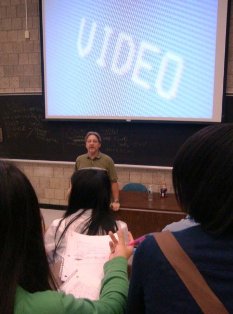The Lecture Is Not Dead
 The lecture is not dead. Despite our best efforts to be sages on stages and guides on the sides of the classroom, students in high schools and especially in colleges will spend a good deal of time listening to someone present from the front of the room.
The lecture is not dead. Despite our best efforts to be sages on stages and guides on the sides of the classroom, students in high schools and especially in colleges will spend a good deal of time listening to someone present from the front of the room.Depending on your school, you may get a few great lecturers during your stay on campus. But thanks to video, YouTube, iTunes U and other sites, we can watch some of the big guns.
BestCollegesOnline.com has put together a collection of links to 100 lectures from some of the world's best scientists.
Here are 15 I have watched to get you started. (Okay, I did not make it through all of them all the way - but isn't that just like real college?)
- Richard Dawkins on our "queer" universe:Listen to this talk from biologist Richard Dawkins to consider the
strangeness of our universe, and how there are so many things out there we can’t comprehend. - Kary Mullis on what scientists do: Biochemist Kary Mullis references the 17th century as he talks about the nature of discovery and experimentation.
- A Passion for Discovery:Peter Freund of the University of Chicago considers the entanglement of physics experiments and their effect on the behavior of scientists.
- A New Age of Exploration: From Earth to Mars: This video isn’t just about space exploration: it’s about the new age of experimentation and research.
- A New Kind of Science - Stephen Wolfram:
Stephen Wolfram’s talk A New Kind of Science, credits simple computer experiments with challenging him to look at research in a new way. - Science and the University - An Evolutionary Tale - The Endless Frontier: Donald Kennedy reflects on how modern research universities and programs were founded.
- Helen Fisher studies the brain in love: If you’ve ever wondered about the physical changes that the brain goes through when you’re in love, watch this lecture.
- Fuzzy Logic: This lecture from computer and information scientist Michael Berthold reveals how fuzzy logic is used for data analysis.
- Science Education in the 21st Century: Using the Tools of Science to Teach Science: Dr. Carl Wierman is a Nobel Prize-winning physicist who comments on the future of science education.
- Renaissance Physicists: Steven Weinberg isn’t too optimistic about the future of science and discusses the characteristics that define a truly ambitious scientist.
- Leading Innovation: This talk explores responsible, effective strategies for uniting technology and business.
- Introduction to Robotics: Stanford’s Oussama Khatib covers the history of robotics, spatial descriptions, kinematics and more.
- Computer System Engineering: Learn the basics of computer system engineering as explained by MIT’s Hari Balakrishnan.
- Ray Kurzweil on how technology will transform us: Ray Kurzweil introduces the idea of a future populated with nanobots.
- Technology and Social Responsibility: Larry Page and Sergey Brin hold technology projects, researchers and companies to a higher standard in this lecture.
Comments
No comments